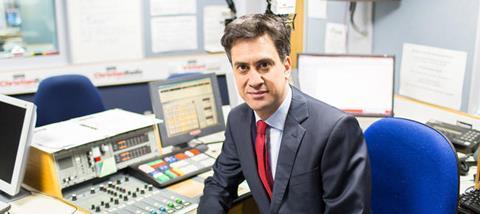
The phrase, ‘we don’t do God’ was made famous by Alastair Campbell. You don’t share the Christian faith but, if elected, would your government ‘do God’?
I’m Jewish. I wasn’t brought up in an Orthodox Jewish household, but my parents were. My dad was Jewish, my mum is Jewish, and obviously I’m Jewish. What’s important for me is the word ‘respect’. Respect for different faiths, respect for people who aren’t religious. Respect, tolerance; I think that those are the important watchwords.
I’m clearly not going to claim that I ‘do God’, but what I do think is important is that sense of respect. I have huge admiration for so many people in the Church and the work they do. I believe in social justice, a more equal, fairer society, and I see those values played out among so many people in the Christian community who worship God and spend so much of their time ensuring people have better lives; whether it’s food banks, or volunteering in the local community, or youth work, or all of those things that Christians in our country do.
You’ve been meeting Church leaders and charity bosses over the last few weeks. Why do you think the role of the Church in society is so important?
There are so many injustices in our society, and if I think about the groups that I was with earlier this week: XLP that helps young people; Open Doors that helps and works with refugees; The Trussell Trust, who run so many of the food banks in our country. In their different ways those high-profile, well-known organisations are multiplied thousands of times over by people who, in their own communities, are doing good, decent work.
I HAVE HUGE ADMIRATION FOR PEOPLE IN THE CHURCH AND WHAT THEY DO
There has been criticism about the high number of people needing to use food banks. How different would food poverty be under a Labour government?
There are three things that we would do differently that speak to the causes of people using food banks. We know what they are. Low incomes: we’d take important measures, like raising the minimum wage, because lots of people who are going to food banks are actually in work. Delays in benefit payments: whether people are actually getting the payments or having to wait, month after month, because of the bureaucracy. And then this issue of debt and legal loan sharking: and that’s why, for example, credit unions are so important. So I’m not saying that we would eliminate food banks on day one. I think it’s 900,000 people now going to food banks in our country; a massive increase in just a few years. We can act on it, and we can do something about it.
Christians are stepping in to fill a gap. Is it the role of the Church or should it be the government working to stop these gaps appearing?
It’s a complicated question. Government’s got to do its bit. It shouldn’t abdicate its responsibility and say, ‘It’s up to voluntary organisations and others to pick up the pieces.’ I think it should be more of a partnership. Obviously, voluntary organisations and volunteers will always play a role in our society; it’s just, where does government’s role end and volunteers’ begin?
How do you foresee a government under your leadership working with faith groups to meet these needs?
I think what most charity organisations want is an understanding of what they can do, not [that we] try to put them in a box. So sometimes it’ll be advocacy and campaigning, sometimes it’ll be delivering services, sometimes it’ll be building capacity and community. And then, whatever the level of funding, the thing I found most of all was a desire for a bit of stability. Not just grants, which are month to month, but some stable funding for charities so that they can actually plan their work. Otherwise, you just get lots of waste, frankly, because you give them money, take away the money, and so on. It just happens too often. So I’m not promising the earth, but I am saying that I think we can develop a better relationship with the charitable sector.
Many Christians have felt let down over the issue of same-sex marriage being fast-tracked, or that their views in the workplace are being marginalised. What would you say to them?
Well, first of all, I want to say to people who feel that – and I’m sorry they feel that – part of being a tolerant society is that people of all faiths and none don’t feel marginalised. Now, that doesn’t mean there aren’t going to be disagreements, for example on equal marriage, but I think it’s really important that Christians don’t feel that. That they feel not just comfortable in their faith, but comfortable that their faith is respected in our country. It’s something you’ve got to work at. The only answer is dialogue, and to listen. Politicians aren’t very good at listening, generally.
THE MOST HEART-SINKING FEELING IS WHEN PEOPLE SAY, ‘I’M NOT INTERESTED’
Are you a good listener?
I try to be. I always find that in a day outside Westminster you learn more than in a week in Westminster. It’s incredibly important to go out and really try to listen to hear other people’s points of view. You can disagree without being disagreeable.
The church-run Show Up campaign is encouraging Christians to engage with politics and to vote. How do we keep engaged with the process as a whole?
There’s a saying that ‘the country’s run by those who turn up’, and that’s really important. It’s great that so many Christians take their responsibilities to vote so seriously. People are cynical about politics, but change doesn’t simply come from politicians; it comes from people. If you think about the issue of food poverty, it’s been made an issue by the churches, by the food banks, by organisations like The Trussell Trust. Politics is too important to be left to politicians. That’s a strange thing for a politician to say, maybe, but I think it is important.
What do you make of celebrities like Russell Brand appearing on Question Time, trying to take part in the process?
I’m sort of less anti-him than most. I don’t agree with him when he says people shouldn’t vote, but I think he’s reflecting what many people feel when he says that. He’s surfaced the argument, now my job is to take it on. I’d encourage people from all walks of life, including celebrities, to get involved.
What’s one of the biggest challenges that we face as a country? It’s people saying politics doesn’t matter. The most heart-sinking feeling as a politician is not actually when people say, when you knock on a door, ‘I’m going to vote for somebody else.’ It’s actually when they say, ‘Ach, I’m fed up with the lot of you. I’m not interested.’ So anything that can be done to engage people in politics is important.
POLITICS IS TOO IMPORTANT TO BE LEFT TO POLITICIANS
The persecution of Christians and minorities in the Middle East is high on the international agenda. What can the UK do to offer more support?
The first thing is to speak out about the persecution of Christians in the Middle East, wherever it happens. Secondly, what we’ve learned – particularly with the war in Iraq ten years ago – is that so-called soft power is as important as hard power, military power. Humanitarian aid, diplomatic and other support for the people who are in crisis is really important. I’m proud that we spend 0.7% of our national income on overseas aid and it goes to save people in really difficult circumstances. Third is doing our bit when it comes to refugees. My parents fled here as refugees. I wouldn’t be doing this job and my parents might not be alive if it hadn’t been for the generosity of Britain.
You’ve been in politics for a long time now. You’ve experienced the highs and lows; the popularity, the unpopularity. How do you cope with all that?
I think it comes with the territory. It’s not an easy job, being leader of the opposition, but for me what really matters is the ability to change things. And that’s the opportunity I have.
I feel a real sense of relish about the coming months, because it’s what democracy is all about. This is now the choice, and the election is nearly upon us. Change is possible. We can build a fairer, more equal, more just country, and that’s what I want to do, and that’s what I hope 2015 will bring.
Premier Christianity is seeking interviews with all the major party leaders ahead of the general election. Read and watch the coverage in full at premier.org.uk/election
Churches across the UK are being urged to play the Show Up video, and to encourage their congregations to vote and to engage with politics on Sunday 25th January.
The EA’s public policy officer, Amelia Abplanalp, says: ‘Our system may not be perfect, but we are privileged to live in a country that is underpinned by a democratic political system.
‘The public perception is that there seems to be very little difference in what the various parties are offering along with a, frankly, lack of inspiring leadership for voters to connect with. This leadership void is most concerning because it’s seeing a new generation of voters not even bothering to exercise their rights and responsibilities as voters.
‘We all have a valuable part to play in politics, and it starts with voting. Let’s own that power and get involved with shaping our nation. It’s OK to be frustrated, to be angry, to be disappointed. But never let yourself be indifferent. The next government will be decided by those who show up to vote on 7th May 2015. It’s that simple. So the question is: will you show up?’
The Show Up initiative, launched by Christians in Politics and the Evangelical Alliance, has the backing of a large number of Christian organisations. Find out more at christiansinpolitics.org.uk/showup
Photos by Steve Fanstone






























